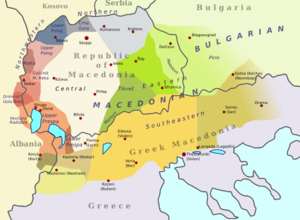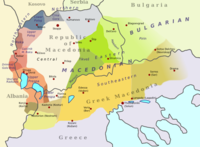| Revision as of 11:24, 13 March 2021 editWikiEditor50 (talk | contribs)Extended confirmed users64,745 edits Reference edited with ProveItTag: ProveIt edit← Previous edit |
Latest revision as of 20:39, 8 November 2024 edit undoMonkbot (talk | contribs)Bots3,695,952 editsm Task 20: replace {lang-??} templates with {langx|??} ‹See Tfd› (Replaced 1);Tag: AWB |
| (13 intermediate revisions by 8 users not shown) |
| Line 1: |
Line 1: |
|
|
{{Short description|Dialect of Macedonian}} |
|
] |
|
] |
|
{{Listen |
|
{{Listen |
| Line 9: |
Line 10: |
|
| description2 = Tale told by a woman from the city of ] |
|
| description2 = Tale told by a woman from the city of ] |
|
}} |
|
}} |
|
The '''Prilep-Bitola dialect''' ({{lang-mk|Прилепско-битолски дијалект}}, ''Prilepsko-bitolski dijalekt'') is a member of the central subgroup of the western group of ] of the ]. This dialect is spoken in much of the ] (more specifically, the ], ], ] and ]), as well as by the ] population in and around ] (Lerin)<ref>'''author missing'''. Леринскиот говор. Македонски jазик, 1983, XXXIV, стр. 23-49.</ref><ref>{{Cite book |last=Hill |first=Peter |url=http://books.google.com/books?id=ibxiAAAAMAAJ |title=The Dialect of Gorno Kalenik |date=1991 |publisher=Slavica Publishers |location=Columbus, OH |language=en |via=Google Books}}</ref> in neighbouring ]. The Prilep-Bitola dialect, along with other peripheral west-central dialects, provides much of the basis for modern ].<ref>{{Cite journal |last=Lunt |first=Horace G. |date=1951 |title=Makedonska gramatika by Krume Kepeski |journal=Language |language=en |volume=27 |issue=2 |pages=180–187 |doi=10.2307/410435 |jstor=410435}}</ref> ] dialects have developed in the cities of ] and ]. |
|
The '''Prilep-Bitola dialect''' ({{langx|mk|Прилепско-битолски дијалект}}, ''Prilepsko-bitolski dijalekt'') is a member of the central subgroup of the western group of ]. This dialect is spoken in much of the ] (more specifically, the ], ], ] and ] municipalities), as well as by the ] population in and around ] (Lerin)<ref>{{Cite book |last=Vidoeski|first=Božidar (Божидар Видоески) |title=Lerinskiot govor. |date=1983|pages=23–49 |language=mk |script-title=mk:Леринскиот говор}}</ref><ref>{{Cite book |last=Hill |first=Peter |url=https://books.google.com/books?id=ibxiAAAAMAAJ |title=The Dialect of Gorno Kalenik |date=1991 |publisher=Slavica Publishers |location=Columbus, OH |isbn=9780893572174 |language=en |via=Google Books}}</ref> in neighbouring ]. The Prilep-Bitola dialect, along with other peripheral west-central dialects, provides much of the basis for modern ].<ref>{{Cite journal |last=Lunt |first=Horace G. |date=1951 |title=Makedonska gramatika by Krume Kepeski |journal=Language |language=en |volume=27 |issue=2 |pages=180–187 |doi=10.2307/410435 |jstor=410435}}</ref> ] dialects have developed in the cities of ] and ]. |
|
|
|
|
|
==Phonological characteristics== |
|
==Phonological characteristics== |
| Line 39: |
Line 40: |
|
::: {{IPA|/ˈkɔɡa/}} (→ {{IPA|/ˈkɔa/}}) → {{IPA|}} (''interr. pron.'' 'when') |
|
::: {{IPA|/ˈkɔɡa/}} (→ {{IPA|/ˈkɔa/}}) → {{IPA|}} (''interr. pron.'' 'when') |
|
*insertion of {{IPA|/t/}} and {{IPA|/d/}} into consonant clusters -{{IPA|/sr/}}- and -{{IPA|/zr/}}-, respectively; for example, {{IPA|/stram/}} from the earlier {{IPA|/sram/}} (''срам'', 'shame') and {{IPA|/zdrɛl/}} from the earlier {{IPA|/zrɛl/}} (''зрел'', 'ripe'). |
|
*insertion of {{IPA|/t/}} and {{IPA|/d/}} into consonant clusters -{{IPA|/sr/}}- and -{{IPA|/zr/}}-, respectively; for example, {{IPA|/stram/}} from the earlier {{IPA|/sram/}} (''срам'', 'shame') and {{IPA|/zdrɛl/}} from the earlier {{IPA|/zrɛl/}} (''зрел'', 'ripe'). |
|
*use of /v/ instead of the archaic /x/: страх (strah) > страв (strav; fear); |
|
*use of /v/ instead of the archaic /x/: страх (strah) > страв ({{transl|mk|italic=no|strav}}; fear); |
|
*In the sub-dialect of ]-], especially among the oldest generations: |
|
*In the sub-dialect of ]-], especially among the oldest generations: |
|
**while {{IPA|}} is an allophone of {{IPA|/l/}} in most dialects (occurring in all positions except before front vowels and {{IPA|/j/}}), in this dialect {{IPA|}} is used instead; ex.: |
|
**while {{IPA|}} is an allophone of {{IPA|/l/}} in most dialects (occurring in all positions except before front vowels and {{IPA|/j/}}), in this dialect {{IPA|}} is used instead; ex.: |
| Line 62: |
Line 63: |
|
*use of -јќум and -јким instead of the standard -јќи for the gerund, in older speakers, e.g. одејќум (while walking). |
|
*use of -јќум and -јким instead of the standard -јќи for the gerund, in older speakers, e.g. одејќум (while walking). |
|
|
|
|
|
==Typical Words== |
|
==Typical words== |
|
⚫ |
*чупе ({{IPA|/ˈt͡ʃupɛ/}}) 'girl' |
|
|
|
|
⚫ |
*преѓе ({{IPA|/ˈprɛɟɛ/}}), преѓеска ({{IPA|/ˈprɛɟɛska/}}) 'recently, lately' |
| ⚫ |
*'''Чупе''' ({{IPA|/ˈt͡ʃupɛ/}}) – 'girl' |
|
|
⚫ |
*модистра ({{IPA|/ˈmɔdistra/}}) 'seamstress' |
| ⚫ |
*'''Преѓе''' ({{IPA|/ˈprɛɟɛ/}}), '''преѓеска''' ({{IPA|/ˈprɛɟɛska/}}) – 'recently, lately' |
|
|
⚫ |
*бендиса ({{IPA|/ˈbɛndisa/}}) 'to have a liking for something or someone', 'to fancy' |
| ⚫ |
*'''Модистра''' ({{IPA|/ˈmɔdistra/}}) – 'seamstress' |
|
|
|
*сурат ({{IPA|/ˈsurat/}}) 'face' |
| ⚫ |
*'''Бендиса''' ({{IPA|/ˈbɛndisa/}}) – 'to have a liking for something or someone', 'to fancy' |
|
|
*'''Сурат''' ({{IPA|/ˈsurat/}}) – 'face' |
|
*плусне ({{IPA|/ˈplusnɛ/}}) 'to fire (a rifle)' |
|
*'''Плусне''' ({{IPA|/ˈplusnɛ/}}) – 'to fire (a rifle)' |
|
*капнат ({{IPA|/ˈkapnat/}}) 'exhausted' |
|
*'''Капнат''' ({{IPA|/ˈkapnat/}}) – 'exhausted' |
|
*греда ({{IPA|/ˈɡrɛda/}}) 'plank', 'beam (of wood)' |
|
*'''Греда''' ({{IPA|/ˈɡrɛda/}}) – 'plank', 'beam (of wood)' |
|
|
|
|
|
|
==Notes== |
|
==Notes== |
The phonological characteristics of the Bitola-Prilep dialect which can also be found in the other peripheral dialects are:


